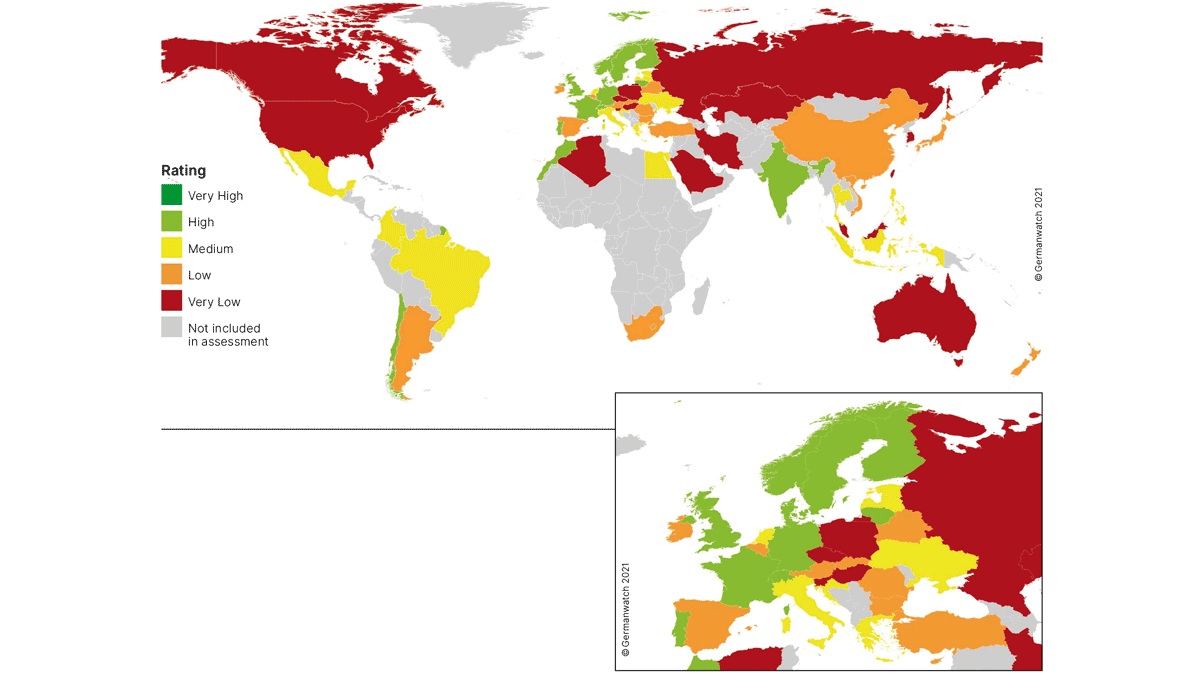CCPI 2022: Romania Ranks 36th
The 17th edition of Climate Change Performance Index (CCPI) was launched on November 9 in Glasgow, index which measures the climate performance of 60 countries in the world, responsible for over 90% of greenhouse gas (GHG) emissions.
Outranked by countries such as Lithuania, Croatia, Estonia, Romania’s position dropped each year, now placing itself in the second half of the ranking, on the 36th position. In 2020, Romania ranked 30th and in 2019 it held the 24th position.
Published annually since 2005, the Climate Change Performance Index (CCPI) is an independent monitoring tool for tracking the climate protection performance of 60 countries and the EU. Every year, the CCPI sets off important public and political debates within the countries assessed.
The CCPI aims to enhance transparency in international climate politics and enables comparison of climate protection efforts and progress made by individual countries. The climate protection performance of those countries, which together account for 92% of global greenhouse gas (GHG) emissions, is assessed in four categories: GHG Emissions, Renewable Energy, Energy Use and Climate Policy.
Still no countries are ranked in the top three overall positions
No country performs well enough in all index categories to achieve an overall very high rating in the CCPI. Therefore, once again, the top three places in the overall ranking remain empty.
Denmark is the highest ranked country in CCPI 2022, but it does not perform well enough to achieve an overall very high rating.
G20 performance
With the United Kingdom (7th), India (10th), Germany (13th), and France (17th), four G20 countries are among the high-performing countries in CCPI 2022. Eleven countries receive a low or very low overall rating; the G20 are responsible for about 75% of the world’s greenhouse gas emissions.
Saudi Arabia is the worst-performing country among the G20, ranked 63rd.
EU performance
Overall, the EU drops six places from last year, to now rank 22nd, and no longer is among the high performers. Notably, because of the CCPI indicators, the EU and its 27 member states are responsible for the EU’s outcome.
Denmark and Sweden are the best-performing EUcountries, at a respective 4th and 5th. A further five countries are high performers.
Up 10 ranks, the Netherlands is one of the most improved countries since last year’s CCPI, though still performing at a medium level.
Slovenia, Czechia, Poland, and Hungary are among the worst-performing countries, each receiving a very low rating.
A strong COVID-19 rebound effect is seen for GHG emissions
The COVID-19 pandemic triggered a sharp, globally unrepresented 5.4% drop in CO2 emissions. A strong rebound effect of greenhouse gas (GHG) emissions has, however, been expected for 2021. The International Energy Agency estimated, for the period of January–July 2021, CO2 emissions would rise 4.8%. CO2 emissions in 2021 will in fact near the record high from 2019 (UNEP and IEA). For a 1.5°C world, it would have been necessary for emissions to fall at their 2020 rate.
Nevertheless, the CCPI 2022 results for GHG Emissions still do not reflect the pandemic’s influence; comparable data are only available up to 2019.
G20 performance
Still, no country rates very high in the GHG Emissions category, but with the United Kingdom, Mexico, India, and Germany, two more G20 countries than in last year’s edition receive an overall high rating.
Seven G20 countries receive a very low rating for their performance, including the Russian Federation, Australia, the United States, and Canada. All other G20 countries generally are equally divided into medium and low ratings.
Like last year, Saudi Arabia remains the worst performing G20 country in this category.
EU performance
As it did last year, the EU rates medium for its overall performance and in all indicators in the GHG Emissions category.
The best performing EU country is Sweden at 5th, though Malta, Denmark, and Germany are rated high in this category.
Among the EU countries that received a very low for their performance are Czechia, Poland, Ireland, and Slovenia.
Romania ranks 18th in this top.
Renewable energy expanding, despite worldwide economic decline
Renewable energy capacity continues to growth at a record pace, despite the effects of the COVID-19 pandemic.
In 2020, 260 GW of renewable energy capacity was installed globally, which accounted for 81% of the total electricity capacity added. In most of the world, wind and solar power were also the cheapest sources of new electricity generation in. Even the cheapest climate-damaging coal-fired power plants are increasingly more expensive than solar and wind power.
As the energy sector greatly contributes to a country’s greenhouse gas emissions, the results of the Renewable Energy rating indicate substantial room for improvement in mitigating emissions by accelerating deployment of renewable energy.
Norway is the first country, receiving a very high rating in this category.
G20-performance
The majority of G20 countries rank low or very low, with Mexico and the Russian Federation as the worst performers among them.
India joins Brazil, Indonesia, and Turkey as the only G20 countries rating high in the Renewable Energy category.
The United Kingdom’s performance however falls from high to medium.
EU performance
The EU’s performance in the Renewable Energy category shows no improvements from last year’s CCPI, as it rates medium.
With Denmark, Sweden, Finland, Latvia, Croatia, and Turkey, six countries are under the top 10 performers in the Renewable Energy category – another four EU countries rate high.
Like last year, no EU country performs very low. Czechia, Poland, and France remain the worst performing EU countries in this category.
Romania ranks 41st in this top.
Energy consumption continues to rise
Last year’s Energy Efficiency Report from the IEA showed that primary energy consumption was on the rise in 2019, and many countries were falling short of their own targets. Despite the COVID-19 pandemic and a subsequent 1.9% drop in final energy consumption, the EU overshot its energy consumption target for 2020 and is thus still not on track to meet its 2030 pledge.
G20-performance
Of the G20 members, seven perform very low in the Energy Use category, with Canada last among them; Nearly all G20 countries show worse performance than in last year’s CCPI.
Mexico, Brazil, United Kingdom, Argentina, and India receive a high rating.
EU performance
As in previous years, the EU rates medium for its performance in the Energy Use category.
Malta and Greece are the only two EU countries that rank high; while Belgium, Luxembourg, and Finland perform very low in this category.
Romania ranks 20th in this category.
Climate policies increasing but still have insufficient ambition
The Emissions Gap Report 2021 states that the current national targets for reducing greenhouse gas emissions are not ambitious enough for a 1.5°C world, despite higher reduction pledges in the latest updated Nationally Determined Contributions (NDC). The current (conditional) targets will lead to 50 GtCO2e emissions in 2030. To be 1.5°C-compatible, emissions should be halved. The 25 gtCO2e gap needs to be closed as soon as possible.
In the Climate Policy indicators in CCPI 2022, not only are the national emissions targets assessed, but also sectoral targets and their specific implementation.
G20-performance
France, China, the United Kingdom, and India are under the 18 countries earning a high rating in the Climate Policy category.
Ten of the G20 countries rate low or very low in this category, up one from last year’s CCPI.
EU performance
With Luxembourg and Denmark, two EU countries lead the Climate Policy ranking, owing to their national and international climate performance. Another seven EU countries are also high performers.
Mostly Eastern European are under the EU countries rated very low.
Romania ranks 52nd in this category.
Romania needs to implement more ambitious policies and support schemes or mechanisms
CCPI 2022 shows that no country is making enough efforts to avoid raising the global temperature by more than 1.5° C. The Scandinavian countries, the United Kingdom and Morocco are the leaders in climate protection, ranking 4th-8th. The top three places remain vacant this year, as none of the countries to which a climate index is assigned has been granted the maximum score.
“Despite the statements of President Klaus Iohannis at COP26, we are far from reaching our climate targets. The fact that we drop more and more in this ranking shows the inaction and inefficient measures that authorities take for environmental protection. Romania has recorded a low score in renewable energy, for which the measures to boost investments, promised for more than two years, haven’t been implemented yet,” said Laura Nazare, Coordinator of the energy transition campaign, Bankwatch Romania.
CCPI experts note that Romania’s measures to mitigate climate change so far aren’t comprehensive enough and do not prove the necessary strategic coherence. In order to reduce GHG emissions, Government focuses mainly on fossil gas, as a key transition technology. But in the National Recovery and Resilience Plan (NRRP), authorities have announced the phasing-out of coal from the energy mix by 2032.
Due to the slow pace of installation of renewable energy capacities, projections show that Romania will not fulfill its EU target of 32% renewable sources by 2030, even if the share in the energy mix is already 25%. This shows Romania’s need to implement more ambitious policies and support schemes or mechanisms to revive the sector. Experts note in particular a significant potential in offshore wind energy, for which the Government will prepare a strategy in the following period.
Most policies on energy use in transport, industry and buildings are included in the NRRP. But the general ambition is insufficient, according to experts. In the transport sector, for example, there is still no target for reducing GHG emissions.
For Romania, the overall poor performance in the field of national climate policies does not show support for European Union’s commitments for reducing GHG emissions by 55% by the next decade and for reaching climate neutrality in 2050.







